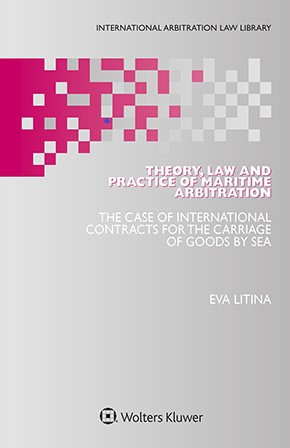Theory, Law and Practice of Maritime Arbitration: The Case of International Contracts for the Carriage of Goods by Sea
ISBN13: 9789403530352
Published: December 2020
Publisher: Kluwer Law International
Country of Publication: Netherlands
Format: Hardback
This is a Print On Demand Title.
The publisher will print a copy to fulfill your order. Books can take between 1 to 3 weeks. Looseleaf titles between 1 to 2 weeks.
Theory, Law and Practice of Maritime Arbitration is a book that delves deep into the phenomenon of maritime arbitration with a specific focus on contracts for the carriage of goods by sea. The author furnishes the first comprehensive and comparative analysis of arbitral practice in the three jurisdictions where the most frequently selected maritime arbitral seats are located: London, New York, and Singapore. It is estimated that over 80% of global trade by volume is carried by sea, making maritime transport the backbone of the global economy. Most disputes in the shipping industry are settled by distinctive, private, mystery-enshrouded arbitral proceedings that are best understood by a close examination of the standard form contracts that are used in practice and of the case law arising therefrom. An in-depth analysis of the applicable rules and relevant case law in each jurisdiction provides the basis from which a comparative assessment of maritime arbitral seats is achieved.
The book addresses the following key aspects of maritime arbitration:
- maritime arbitration’s definition, origins, theoretical underpinnings, socioeconomic context, and significance;
- the maritime-specific reasons for the wide use of ad hoc versus institutional arbitration;
- the international instruments governing arbitration in contracts for the carriage of goods by sea;
- the shipping industry’s pursuit of self-regulation via standard form contracts;
- the arbitration agreement contained in standard form charterparties and bills of lading;
- maritime arbitration’s unique approach to judicial review, confidentiality, and arbitrator impartiality;
- the specific dispute resolution objectives that compel a comparative assessment of maritime arbitral seats; and
- the future of maritime arbitration in light of international political, financial, and technological developments.
Apart from the three main maritime arbitral seats, the analysis touches on maritime arbitration in other relevant jurisdictions, such as Hong Kong, Greece, Japan, and Korea, thus affording a comparison of the process in common and civil law jurisdictions. The book concludes by considering the potential impact of the current international political landscape and suggesting future perspectives and research in international maritime arbitration.
